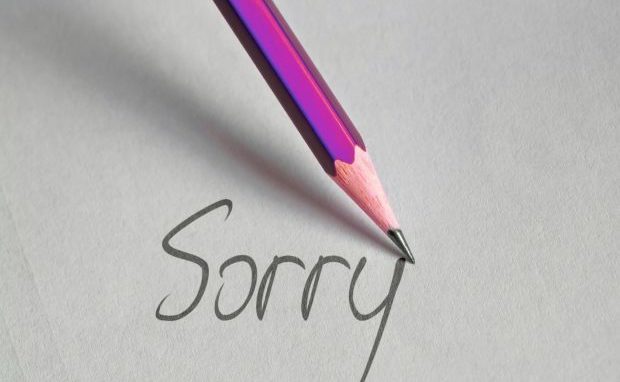Should We Stop Saying Sorry?

The female apology has been the subject of discussion for a while now, especially in the context of the workplace. The issue is women’s perceived tendency to apologise excessively, and how it could have a negative impact on their work and social lives.
Here, apologising excessively means using conciliatory and deferential words and phrases where they’re not strictly required.
Examples include beginning a reasonable request with “sorry”, using the word “just” unnecessarily in order to water down a statement, and saying things like, “I’m sure this is silly, but…” before expressing an opinion in a meeting.
Why is apologizing a problem for professional women?
In 2014, Pantene’s ‘Sorry, Not Sorry’ advert brought the conversation to the fore, with numerous articles advising women to take on board the brand’s message (this one in Time, for instance, and later on, this one in The New York Times).
The same thing happened in early 2016, when the Just Not Sorry app was launched. Apologising excessively makes women seem unsure of themselves, too eager to please, unprofessional or even defensive, it was argued.
Women were encouraged to take back their power and stop saying sorry for everything.

Do women actually apologize more than men?
Critics of the stop-apologising advice point out that we don’t really know for sure whether women tend to apologise more than men, in the workplace or any other environment.
However, there is evidence to suggest that they do, including two much-cited studies published in the journal Psychological Science in 2010.
Women participating in the studies reported apologising more than did their male counterparts – and they also considered themselves to have behaved in ways that would warrant an apology on more occasions.
According to the studies’ authors, this indicated that men “have a higher threshold for what constitutes offensive behaviour.”
Another survey, this one published by YouGov in 2015, found that UK and US women were, in general, more likely to apologise than men.
Men and women were asked whether they would apologise in a variety of different situations – for instance, “if I make a joke that upsets someone” and “correcting someone who is wrong”.
These examples alone revealed a divide between women and men, with 65% of British women (versus 49% of British men) stating that they would apologise for the former, and 29% of British women (versus 26% of British men) the latter – that’s 112 and 133 female apologies to every male apology respectively.
Is apologizing really a bad thing?
What this research doesn’t tell us is whether women are over-apologising, whether their threshold for what constitutes offensive behaviour is too high, and indeed, whether their tendency to apologise and check their behaviour more than men is a worse thing than men’s tendency to apologise less and not check their behaviour as much.

It’s notable that of the British women who responded to the YouGov survey, 44% said that women apologise too much, while 49% thought that men apologised too little. In contrast, the larger part of the British men surveyed believed that both sexes got it “about right” when it came to apologising.
Commentators have expressed concern that telling women to cut down on apologies (and other deferential words and phrases) is just another way of controlling female speech, and perpetuates the myth that it’s a man’s world.
Why is it, they ask, that for a woman to get by, she has to speak and act like a man? Harriet Minter, editor of The Guardian’s Women in Leadership section, puts it this way: “If being successful in a man’s world means emulating the worst traits of those men, then I’ll take middle of the road thanks.”
Meeting In The Middle
The middle of the road might well be the best option for both sexes. While women could benefit from deleting that “just” in the email they’re about to send to a colleague, it might equally be beneficial for men to attempt a little more courtesy in their interactions.
We’re all individuals with our own styles of behaviour, and if we’re happy with those styles (and they aren’t harming anyone else), we should stick to them. Empowerment means being who you want to be – you should never have to apologise for that.
Rosemary Proctor writes for Inspiring Interns, which specialises in sourcing candidates for internships and graduate jobs.

